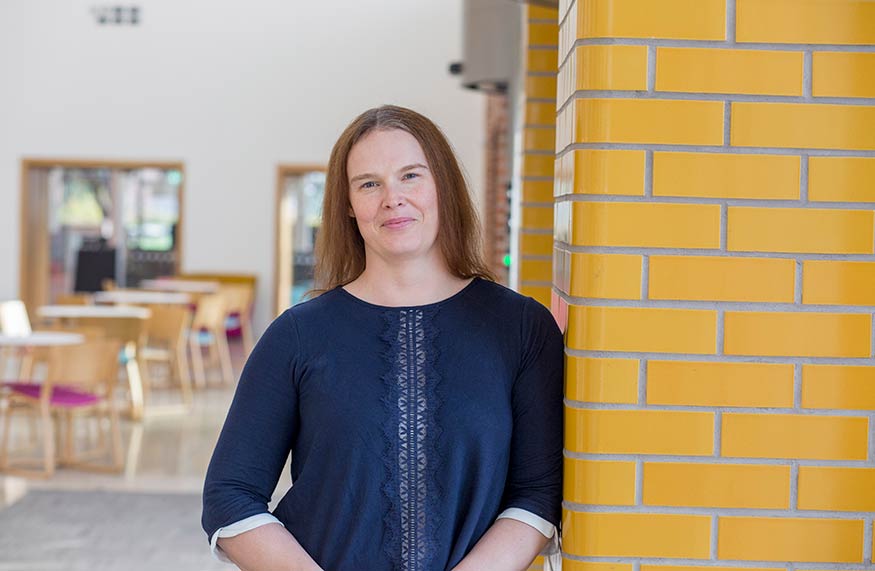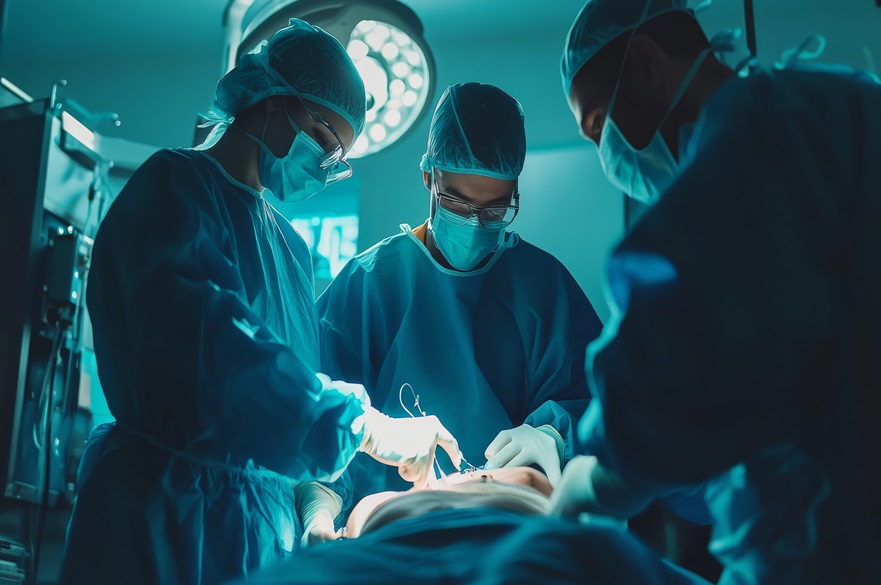Role
Dr Samantha McLean is an Associate Professor of Infection Prevention and Control in the department of Biosciences. She is a member of the Antimicrobial Resistance, Omics and Microbiota (AROM) research theme, microbiology academic lead for the Medical Technologies Innovation Facility (MTIF), and Director of the UK Healthy Ageing Innovation Consortium. Her research focuses on developing antimicrobial therapies and evaluating infection prevention and control implications during the development of materials and devices, aiming to reduce microbial burden.
She is a module leader in both undergraduate and postgraduate Molecular Microbiology modules. Dr McLean is a Masters and Undergraduate degree research project supervisor and currently teaches on the following modules:
- Infectious Diseases and their Control
- Molecular Microbiology (UG and PG)
Career overview
Dr McLean received a BSc (Hons) degree in Microbiology at the University of Leeds before moving to the University of Sheffield where she completed her PhD in the department of Molecular Biology and Biotechnology. She spent a further six years at the University of Sheffield as a Research Associate investigating the interaction of enterobacteria with small molecules of the innate immune response, including reactive oxygen species, reactive nitrogen species and carbon monoxide.
Dr McLean went on to spend two years at the University of Nottingham as a Research Fellow researching the optimisation of industrial gas fermentation for commercial low-carbon fuel and chemical production through systems and synthetic biology approaches.
In February 2016 Dr McLean took up the position of Lecturer in Microbiology at Nottingham Trent University, was promoted to Senior Lecturer in 2017 and to Associate Professor in 2024.
Research areas
Dr McLean is a member of the Antimicrobial Resistance, Omics & Microbiota research group, situated within the Centre for Systems Health and integrated Metabolic Research (SHiMR). Her research interests include investigating the microbial colonisation of medical device materials and the efficacy of novel approaches to prevent colonisation. She has a wider interest in the characterisation of novel antimicrobial drugs as part of the development pipeline towards regulatory approval and the market.
The McLean group is part of the School of Science and Technology, within our rapidly evolving Clifton Campus, a multi-award-winning site with state of the art bioscience research and teaching labs. Clifton Campus is also home to the Medical Technologies Innovation Facility, a pioneering dual-site research and development facility, that provides a bridge between academia and industry, to enable the acceleration of innovative medical technologies where Dr McLean is the Academic Lead for Microbiology.
Research interests:
Overarching research theme
The overuse and misuse of antibiotics in health care, agriculture and industry is pushing us towards a post antibiotic era. The rate at which antimicrobial resistance (AMR) is rising is vastly greater than the development of new antibiotics. Resistant strains are increasingly found within the community where previously they were restricted to the hospital setting. Alongside this, resistance to last line antibiotics such as colistin is now more frequently observed. With annual death rates attributed to AMR predicated to reach 10 million by 2050 it is vital that novel antimicrobial options are explored. Our research is focussed in two main areas: i) understanding infection risks associated with wearable and implanted devices and ii) understanding the activity of antimicrobial drugs and surfaces under development.
Metals as antimicrobials
Metal-based compounds, including silver, copper and ruthenium, offer potential as a antimicrobials. Silver has demonstrated antimicrobial application in numerous research studies and has been used widely as an antimicrobial throughout history. Today, silver salts are used in materials from advanced wound dressings to lunch boxes. Ruthenium-containing compounds have been less well studied but offer significant potential as a novel antimicrobials.
Our research group explores the antimicrobial action of metal-containing compounds to understand the mechanisms of action. We utilise a variety of antimicrobial efficacy assays, ranging from simple testing methods for rapid screening to in-depth analysis of antimicrobial activity and toxicity of compounds to moth larvae and human cell lines. Alongside this, transcriptomic analysis is undertaken using cutting-edge RNASeq technologies that allows us to understand how bacteria sense and respond to the threat of these novel antimicrobials.
Microbial colonisation of medical device materials (biofilms)
Microbial contamination caused by biofilms is a major global challenge, costing $4tn per annum across all industries, exerting economic, social, and environmental impact. Global business spends considerable resources on microbial contamination prevention and eradication technologies. Microbes colonise surfaces by aggregating to form biofilms, which makes them resistant to antimicrobials and extremely difficult to remove. Bacterial infections caused by colonisation of implanted medical devices act as a driver of serious infections and current strategies to control them are limited to debridement, device removal and aggressive antibiotic treatment. Therefore, it is critical that medical device materials be developed with antibiofilm properties to reduce the incidence and severity of infections.
Our research here investigates the infection risks associated with wearable and implanted medical devices and investigates ways to prevent and/or manage biofilm colonisation of these surfaces. We are developing models of biofilm formation in a variety of clinically relevant conditions, including in CDC Bioreactors, Drip Flow Reactors and Modified Robbins Devices, to screen the efficacy of new antimicrobial medical device materials in a manner that has real-world relevance and supports product development. We also aim to drive antimicrobial medical device development with industry and inter-disciplinary academic partners to translate our research into real-world impact.
Biofilm standards
Commercialisation of new materials that prevent microbial contamination need to demonstrate safety and effectiveness. However, within the UK there is a lack of standards that can be used to support product claims – such as “prevents biofilm formation”. This means that tests that are used are often inadequate for real world scenarios and lead to high failure rates as well as lengthy and costly regulatory claim processes. Industry consultation consistently provides the same messages: that the lack of biofilm standards is holding back industry innovation and leads to a failure to address these major challenges. Indeed, the UK government recognise the importance of standards stating that standards, measurement, and accredited conformity assessment play a critical role in supporting innovation and will enable its swift and safe commercialisation.
Therefore, it is not enough to only develop new antimicrobial materials, we must also invest time into the development of standard methodologies if we are to move the industry forward and break down these barriers to innovation. Dr McLean is a member of the British Standards Institute CH/216/0-/03 panel on products and biofilms that are investigating the development of new BSI biofilm standards.
The UK Healthy Ageing Innovation Consortium
By 2040, nearly one in seven people in the UK will be aged over 75, many living with multiple morbidities. By contrast, there are areas of the world with lower rates of chronic disease, where people live longer healthier lives. The UK Healthy Ageing Innovation Consortium supports researchers to transcend traditional disciplinary boundaries and collaborate across sectors to formulate and implement viable solutions that promote healthy ageing and drive transformative change.
Dr McLean is Director of the UK Healthy Ageing Innovation Consortium, which consists of three transversal themes in metabolic health, healthy ageing across the life course, and transformative technologies to tackle health inequalities.
Working in the McLean group
Opportunities arise to carry out postgraduate research towards a PhD in the areas identified above. Further information may be obtained on the NTU Research Degrees website.
External activity
Dr McLean is a member of the Healthcare Infection Society, the Royal Society for Biology, the Microbiology Society and Applied Microbiology International.
Dr McLean is a STEM Ambassador, regularly undertaking outreach projects to develop microbiology literacy and to promote women and girls in STEM. Some of her outreach activities have been showcased on the Applied Microbiology International website.
Sponsors and collaborators
Funders:
Research in the McLean group is supported by Innovate UK, the National Biofilms Innovation Centre, the BBSRC and the National Institute for Health and Care Research.
Publications
Selected publications:
Afolayan JS., Varney AM., Thomas JC., McLean S., and Perry CC. (2025) A rapid microwave approach for 'one-pot' synthesis of antibiotic conjugated silver nanoparticles with antimicrobial activity against multi-drug resistant bacterial pathogens. Colloids and Surfaces B: Biointerfaces 245:114280
Hall J., Mekapothula S., Varney AM., Craske, D., McLean S., and Cave GWV. (2024) Antimicrobial copper oxide nanoparticle coatings for medical devices. Nanomaterials 14, 1899
Varney AM., Smitten KL., Southam, HM., Fairbanks, S., Robertson, C., Thomas JA., and McLean S. (2024) In vitro and in vivo studies on a mononuclear ruthenium complex reveals it is a highly effective, fast-acting, broad-spectrum antimicrobial. ACS Infectious Diseases 10 (9), 3346-3357
Varney AM., Mannix-Fisher E., Thomas, J., and McLean S. (2024) Evaluation of phenotypic and genotypic methods for the identification and characterisation of bacterial isolates recovered from catheter-associated urinary tract infections. Journal of Applied Microbiology 135(7), lxae155
Mekapothula S., Chrysanthou E., Hall J., Nekkalapudi PD., Mclean S., and Cave GWV. (2024) Antipathogenic applications of copper nanoparticles in air filtration systems. Materials 7(11), 2664
McLean, S. (2023) What is antimicrobial resistance and why is it a problem? From: Pre and Probiotics for Poultry Gut Health, Poultry Science Symposium volume 33. CABI, ISBN : 978-1-80062-272-2
Mannix-Fisher, E., and McLean, S., (2021) The antimicrobial activity of silver acetate against Acinetobacter baumannii in a Galleria mellonella infection model. PeerJ 9:e11196
Varney, A.M., Smitten, K.l., Thomas J.A., and McLean, S. (2020) Transcriptomic Analysis of the Activity and Mechanism of Action of a Ruthenium(II)-Based Antimicrobial That Induces Minimal Evolution of Pathogen Resistance. ACS Pharmacology & Translational Science 4(1), 168–178

